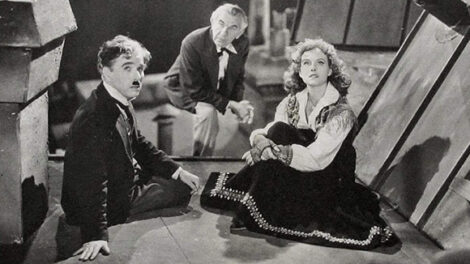[8]
There’s something incredibly poetic about Charlie Chaplin, who built a career over the 1920s and 1930s as a silent screen star, finally opening his mouth in his first sound film, 1940’s The Great Dictator. The decision wasn’t an arbitrary one. Chaplin was speaking out because he finally had something important to say.
The Great Dictator splits its time between two characters, both played by Chaplin — a Jewish barber who falls in with the resistance, and Adenoid Hynkel, an obvious parodic riff on Adolf Hitler. Through a series of comic set-pieces and cinematic serendipity, one character is ultimately confused for the other, allowing the Jewish barber to address Hitler’s masses in a finale speech among the most memorable in all of filmdom.
This is a brave film from a brave filmmaker, one that has obvious relevance today — and for however long the flames of fascism threaten to engulf us again. But Chaplin doesn’t sacrifice comedy for solemnity — oh, no. Comic highlights include a day in the life of the narcissistic Adenoid Hynkel, who poses for painters and sculptors between failed demonstrations of new potential weapons. Chaplin’s depiction of Hynkel is the single-funniest thing throughout the film, really. The only thing that rivals Chaplin’s performance is when Hynkel shares the screen with fellow dictator Benzino Napaloni (Jack Oakie).
At just over two hours in length, The Great Dictator might be a little longer than it needs to be. But Chaplin is a consummate entertainer who ensures there’s never a dull moment. In addition to the incredibly inspiring finale speech, the film offers one other moment of cinematic sublimity — a scene in which Chaplin, as his Hitler doppelganger, kicks an inflated globe up into the air and performs a sort of aerial ballet with it — bouncing it off his butt, keeping it up in the air, playing with the planet like it’s a toy. Just as reckless fascists do.
With Paulette Goddard (Chaplin’s wife at the time) as the film’s love interest and fellow resistance fighter.
Oscar Nominations: Best Picture, Leading Actor (Chaplin), Supporting Actor (Oakie), Original Screenplay (Chaplin), Original Score (Meredith Willson)


